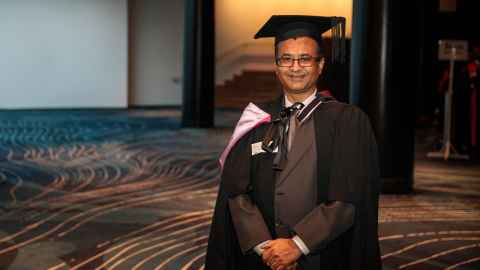Midlife career switch: reporter to researcher
22 July 2019
After nearly 25 years as a health journalist, Rajesh Kumar retrained as a public health researcher. He reflects on his experiences, and his masters thesis on barriers to Aotearoa New Zealand becoming smokefree.

For nearly 25 years, I worked as a journalist, first in India, Cambodia, and Australia, and then with New Zealand and Singapore's specialist medical media. While researching a story for a medical newspaper, I would often get carried away delving deep into different research methodologies and their strengths and weaknesses - something journalists don't get to explore routinely. Though none of this ever got published, it did gave me an interesting insight into the process.
Many times, I was told by my interviewees that I should consider getting into research myself. I always liked the idea but had to put it on the backburner, as I was raising a boy as a single parent and chasing deadlines to pay the bills and the mortgage.
The turning point came somewhere around 2012. I had just gone through a bad break-up, had lost my home due to financial strains, and was dealing with my own depression as a result. My work and the relationship with my son suffered, and I started experiencing workplace bullying. Every aspect of my life seemed bleak, hopeless. After the customary leg-thrashing to stay afloat for a few months, a realisation dawned on me: maybe I don't need another job as a journalist; maybe now is the time to prepare myself for a career switch.
While significant progress has been made in reducing the overall smoking rates here...the reduction has been slow in vulnerable populations, including mental health and addiction patients, who are among the heaviest smokers.
During a careers event at the University, I was encouraged to pursue public health if research was my primary interest. Noticing my nervousness, a professor I spoke to at the School of Population Health said: 'Do a paper or two without quitting journalism altogether and see how you feel about it.'
While working as a medical editor in Singapore, I enrolled in two courses and did better than I expected - I was hooked. I've come to view public health research as a logical progression of my role as a health journalist.
There is some cross-over between journalism and public health. The journalistic qualities of curiosity, persistence and scepticism are very useful in any type of research. I am often pleasantly surprised when I discover links between the news stories I wrote years ago and their potential relevance to public health even today.
But there are major differences, too. I had spent a big part of my professional life essentially summarising 20-30 page-journal papers into 500-word news reports, with comment and analysis. Here, I was required to go in the opposite direction. Thankfully, I was supported throughout my sometimes arduous journey by my supervisors, Professor Chris Bullen and Dr Sarah Appleton in the School of Population Health.
My masters thesis looked at ‘the elephant in the room’ for the Smokefree Aotearoa 2025 campaign. While significant progress has been made in reducing the overall smoking rates here, especially among youth, the reduction has been slow in vulnerable populations, including mental health and addiction patients, who are among the heaviest smokers.
No up-to-date data are available on smoking among mental health and addiction services clients (patients), but 2003-2004 figures to suggest 32 percent of New Zealanders with a record of at least a 12-month long psychiatric episode were current smokers, compared to 21 percent of the general population in that year. My evaluation of Let's Kick Butt 2017, an Auckland-based group smoking cessation intervention for mental health and addiction patients, revealed that the patients were slipping back into their old smoking habits once the intervention was over.
The cost of postgraduate studies, compounded by loss of earnings, can be a barrier to returning to university in mid-life. It wasn’t easy, but I managed by being resourceful: I funded my studies with a scholarship, savings, student loans, a short stint in banking and, when all that dried up, loans from family and friends and WINZ supplements until I got my first job in public health research.
Even before I graduated in May 2019, I was offered a job working on an HRC-funded project at the School of Population Health for devising a practical framework from a theoretical model for promoting health-seeking behaviour by individuals who often resist change. I then signed a contract with the National Foundation for Deaf and Hard of Hearing to set up public health research protocols for them. In July 2019, I returned to the School of Population Health to work on a WHO-related project.
I do miss the immediacy of journalism - in public health research, I may work on an original piece of writing for six months before it can get published in a peer-reviewed journal. But when it comes to variety, public health is a match for journalism. I am enjoying jumping from project to project rather than committing long-term to a single topic - that is, until I can find a topic that engages me enough to spend four to five years working on it as a PhD scholar!
Major upheavals can act as a catalyst for a positive change in life. That has certainly proven true in my case.
Media contact
Nicola Shepheard | Media Adviser
Tel: +64 9 923 1515
Mob: +64 27 537 1919
Email: n.shepheard@auckland.ac.nz